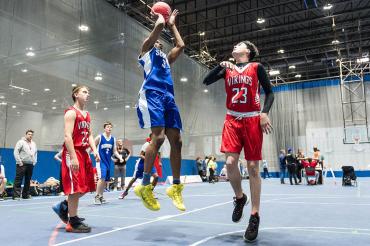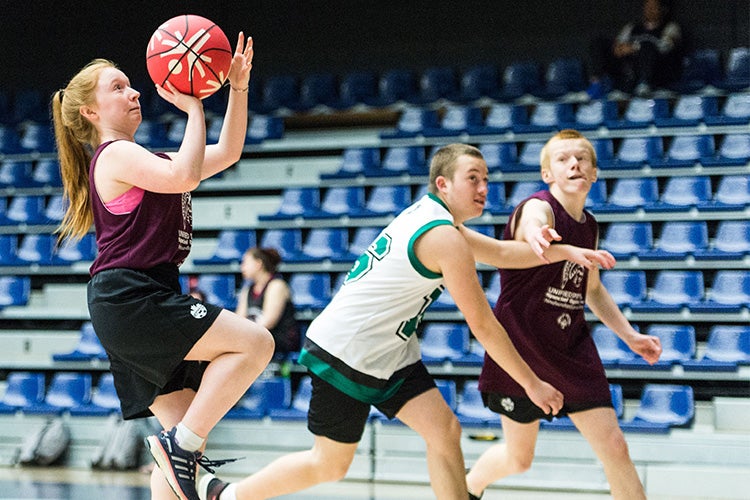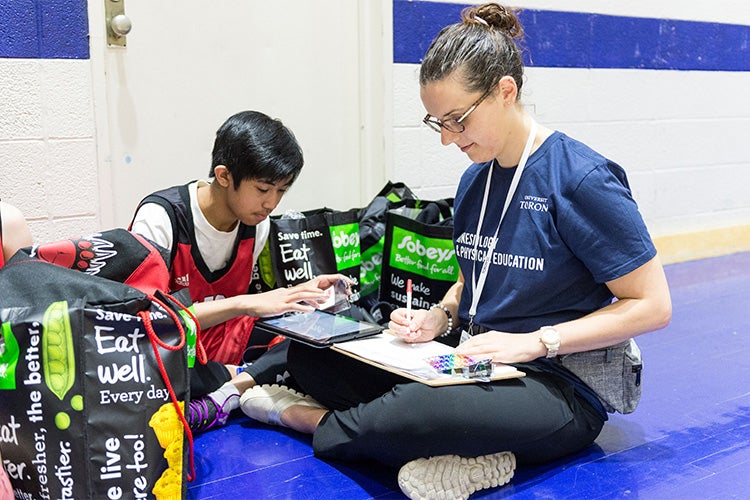U of T researchers evaluate experiences of athletes participating in Special Olympics

Published: May 16, 2019
As many as 2,500 global athletes, aged 13 to 21, are competing in five sports during the Special Olympics Ontario Invitational Youth Games in Toronto this week – and three of the five events are taking place at the University of Toronto.
That’s not the only source of excitement at U of T’s Faculty of Kinesiology & Physical Education (KPE).
While the Games are running, KPE researchers will be busy evaluating the experiences of the youth competing in the traditional division, where all athletes on the team have an intellectual disability, and a unified division, where athletes with and without an intellectual disability will have the opportunity to compete on the same team.
“Sport participation is a core dimension of health during adolescence and early adulthood, often providing opportunities for improved social functioning through the development of friendships and enhanced self-perceptions,” says Kelly Arbour-Nicitopoulos, an assistant professor at KPE and lead of the study.
She and her team of 10 undergraduate and graduate students will administer an online survey to 500 youth athletes with and without intellectual disability participating in the Games to assess the relationships between the core elements of quality sport experiences – autonomy, belonging, challenge, engagement, mastery and meaning – with the youth athletes’ demographic background and type of sport program involvement.
They will also conduct interviews with 25 youth athletes with and without intellectual disabilities, 15 parents and 15 coaches to explore who may gain the most optimal sport participation experience from traditional and unified programs.
“We are hoping to shed some light on the athletes’ needs, supports and interests within these two types of sport programs. The theoretical insights will ideally lead to practice recommendations, which could further enhance the sport participation experiences of youth athletes within Special Olympics’ sport programs in the future,” says Arbour-Nicitopoulos, who is collaborating on this study with Professor Rebecca Renwick from U of T’s department of occupational science and occupational therapy and Virginia Wright, a senior scientist at the Bloorview Research Institute.

A basketball player takes a shot at U of T’s Goldring Centre for High Performance Sport (photo by Seyran Mammadov)
Bringing people with and without disabilities together is not necessarily unique, says Arbour-Nicitopoulos.
“The trick is how do you do it well? How do Unified Sports do it? How can that be modeled in other types of sport organizations?” she says.
Arbour-Nicitopoulos explains that, while there has been little evaluation around unified sport experiences, there’s been a lot of push in the sport sector, particularly in Canada, to look at the individual’s experience in sport and physical activity.
“This event provides us with an opportunity to hear from the youth themselves, as opposed to the parents or coaches telling us the story, which tends to be the case with individuals with intellectual disability. We want to learn about their experiences to see if there are some common elements that can be fed back to Special Olympics,” she says.

Krystn Orr (right) is in her third year of a PhD degree at KPE, doing research on recreational sport for individuals with disabilities between the ages of 18 and 25 (photo by Seyran Mammadov)
The information could also be valuable to other organizations looking to provide a more inclusive sport experience.
“Special Olympics have taken on the lead with Unified Sports to create more social inclusion for individuals with intellectual disability, but everyone, particularly in the sport and physical activity sector, should be doing it,” says Arbour-Nicitopoulos. “Sharing this information may help better prepare staff, including physical education teachers, who often aren’t trained to provide inclusive physical education classes.”
In fact, one of the deliverables of the study, which is funded by Special Olympics Canada, is to host webinars tailored to youth with and without intellectual disabilities, parents and coaches by 2020.
“I love seeing the youth participating in activities they truly enjoy,” says Krystn Orr, one of the graduate students working on the study.
“Seeing youth in a competitive environment is very exciting, and to explore those experiences further really sparks my interest,” says Orr, who is in her third year of a PhD degree at KPE, doing research on recreational sport for individuals with disabilities between the ages of 18 and 25.
The 2019 Special Olympics Ontario Invitation Youth Games run from May 14 to 17. They are free of charge and open to all spectators.
The events at U of T are taking place at U of T’s Athletic Centre, Goldring Centre for High Performance Sport, Varsity Stadium and Back Campus.



